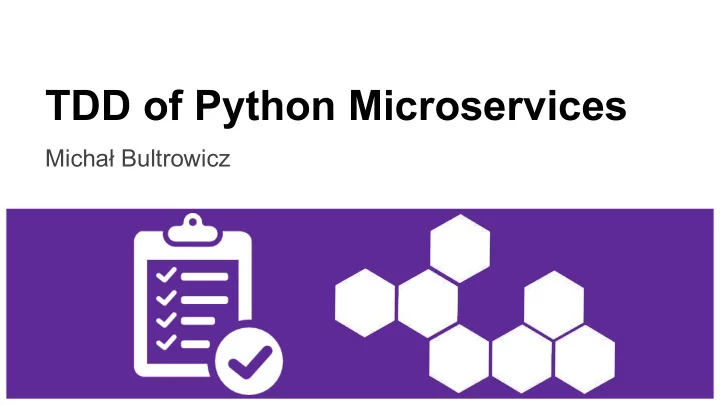

TDD of Python Microservices Michał Bultrowicz
About me ● Name: Michał Bultrowicz ● Previous employers: Intel… that’s the full list ● Previous occupation: technical team-leader on Trusted Analytics Platform project ● Current Occupation: N/A ● “Website”: https://github.com/butla (...working on a blog...)
Microservices: - services - micro - independent - cooperating
Twelve-Factor App (http://12factor.net/) 1. One codebase tracked in 7. Export services via port binding revision control, many deploys 8. Scale out via the process model 2. Explicitly declare and isolate 9. Maximize robustness with fast dependencies startup and graceful shutdown 3. Store config in the environment 10. Keep development, staging, and 4. Treat backing services as production as similar as possible attached resources 11. Treat logs as event streams 5. Strictly separate build and run 12. Run admin/management tasks stages as one-off processes 6. Execute the app as one or more stateless processes
Word of advice ● Start with a monolith. ● Separating out microservices should be natural.
TESTS!
Tests ● Present in my service (around 85% coverage). ● Sometimes convoluted. ● Didn’t ensure that the service will even get up.
UNIT tests ● Present in my service (around 85% coverage). ● Sometimes convoluted. ● Didn’t ensure that the service will even get up
Tests of the entire application! ● Run the whole app’s process. ● App “doesn’t know” it’s not in production. ● Run locally, before a commit. ● High confidence that the app will get up. ● ...require external services and data bases...
External services locally? Service mocks (and stubs): ● WireMock ● Pretenders (Python) ● Mountebank
Data bases (and other systems) locally? ● Normally - a tiresome setup ● Verified Fakes - rarely seen ● Docker - just create everything you need
Now some theory
http://martinfowler.com/articles/microservice-testing/#conclusion-test-pyramid
Harry J.W. Percival, “Test Driven Development with Python”
TDD (the thing I needed!) Pros: ● Confidence in face of changes. ● Automation checks everything. ● Ward off bad design. Requirements: ● Discipline ● Tools
Implementation
PyDAS ● A rewrite of an old, problematic (Java) service. ● My guinea pig. ● TDD helped a lot. ● ...not perfect, but educating https://github.com/butla/pydas
Pytest ● Concise ● Clear composition of fixtures ● Control of this composition (e.g. for reducing test duration) ● Helpful error reports
def test_something (our_service, db): db.put(TEST_DB_ENTRY) response = requests.get( our_service.url + '/something', headers={'Authorization': TEST_AUTH_HEADER}) assert response.status_code == 200
import pytest , redis @pytest .yield_fixture(scope='function') def db (db_session): yield db_session db_session.flushdb() @pytest .fixture(scope='session') def db_session (redis_port): return redis.Redis(port=redis_port, db= 0 )
import docker , pytest @pytest .yield_fixture(scope='session') def redis_port (): docker_client = docker.Client(version='auto') download_image_if_missing(docker_client) container_id, redis_port = start_redis_container(docker_client) yield redis_port docker_client.remove_container(container_id, force= True )
@pytest .fixture(scope='function') def our_service (our_service_session, ext_service_impostor): return our_service
Mountepy ● Manages a Mountebank instance. ● Manages service processes. ● https://github.com/butla/mountepy ● $ pip install mountepy
import mountepy @pytest .yield_fixture(scope='session') def our_service_session (): service_command = [ WAITRESS_BIN_PATH, '--port', '{port}', '--call', 'data_acquisition.app:get_app'] service = mountepy.HttpService( service_command, env={ 'SOME_CONFIG_VALUE': 'blabla', 'PORT': '{port}', 'PYTHONPATH': PROJECT_ROOT_PATH}) service.start() yield service service.stop()
@pytest .yield_fixture(scope='function') def ext_service_impostor (mountebank): impostor = mountebank.add_imposter_simple( port=EXT_SERV_STUB_PORT, path=EXT_SERV_PATH, method='POST') yield impostor impostor.destroy() @pytest .yield_fixture(scope='session') def mountebank (): mb = Mountebank() mb.start() yield mb mb.stop()
Service test(s) ready!
Remarks about service tests ● Will yield big error logs. ● Breaking a fixture yields crazy logs. ● Won’t save us from stupidity (e.g. hardcoded localhost)
The danger of “other people’s commits”
Our weapons ● Test coverage ● Static analysis (pylint, pyflakes, etc.) ● Contract tests
.coveragerc (from PyDAS) [report] fail_under = 100 [run] source = data_acquisition parallel = true http://coverage.readthedocs.io/en/coverage-4.0.3/subprocess.html
Static analysis tox.ini (simplified) [testenv] commands = coverage run -m py.test tests/ coverage report -m /bin/bash -c "pylint data_acquisition --rcfile=.pylintrc" https://tox.readthedocs.io
Contract tests: a leash for the interface
swagger: '2.0' http://swagger.io/ info: version: "0.0.1" title: Some interface paths: /person/{id}: get: Contract is separate from the code! parameters: - name: id in: path required: true type: string format: uuid responses: '200': description: Successful response schema: title: Person type: object properties: name: type: string single: type: boolean
Bravado (https://github.com/Yelp/bravado) ● Creates service client from Swagger ● Verifies ○ Parameters ○ Returned values ○ Returned HTTP codes ● Configurable (doesn’t have to be as strict)
Bravado usage ● In service tests: instead of “requests” ● In unit tests: ○ https://github.com/butla/bravado-falcon ● Now they all double as contract tests
from bravado.client import SwaggerClient from bravado_falcon import FalconHttpClient import yaml import tests # our tests package def test_contract_unit (swagger_spec): client = SwaggerClient.from_spec( swagger_spec, http_client=FalconHttpClient(tests.service.api)) resp_object = client.v1.submitOperation( body={'name': 'make_sandwich', 'repeats': 3 }, worker='Mom').result() assert resp_object.status == 'whatever' @pytest .fixture() def swagger_spec (): with open('api_spec.yaml') as spec_file: return yaml.load(spec_file)
def test_contract_service (swagger_spec, our_service): client = SwaggerClient.from_spec( swagger_spec, origin_url=our_service.url)) request_options = { 'headers': {'authorization': A_VALID_TOKEN}, } resp_object = client.v1.submitOperation( body={'name': 'make_sandwich', 'repeats': 3 }, worker='Mom', _request_options=requet_options).result() assert resp_object.status == 'whatever'
“Our stuff” is taken care of...
???
More about tests / microservices / stuff “Building Microservices”, O'Reilly “Test Driven Development with Python” http://martinfowler.com/articles/microservice-testing/ “Fast test, slow test” (https://youtu.be/RAxiiRPHS9k) Building Service interfaces with OpenAPI / Swagger (EP2016) System Testing with pytest and docker-py (EP2016)
Recommend
More recommend